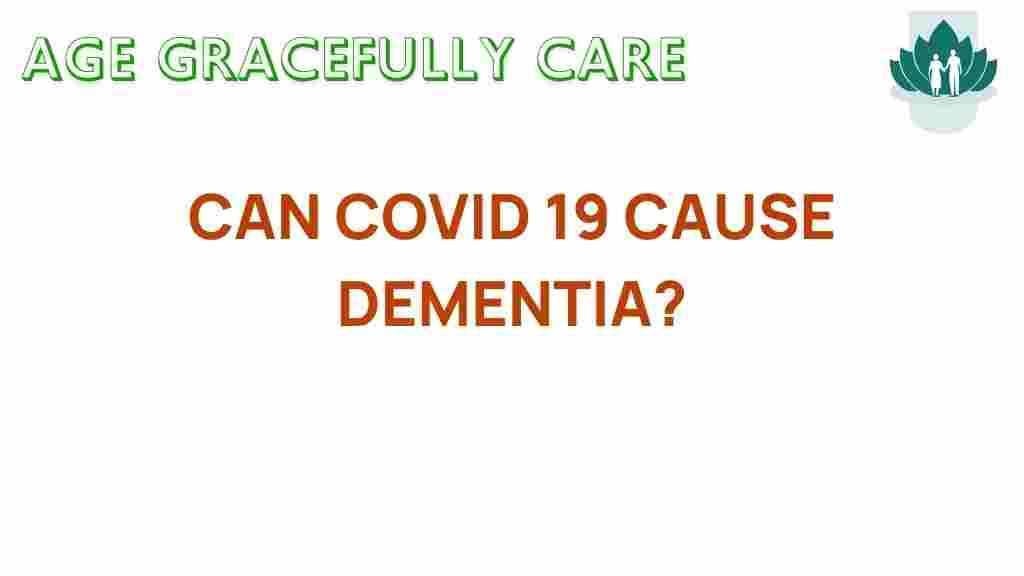Unraveling the Link: Can COVID-19 Trigger Dementia?
The COVID-19 pandemic has transformed the landscape of global health, leading to an increased focus on various health issues, including the potential neurological effects of the virus. As research continues to unfold, a crucial question arises: can COVID-19 trigger dementia? This article delves into the connections between COVID-19, dementia, and cognitive decline, exploring the implications for brain health and mental health.
Understanding COVID-19 and Its Neurological Effects
COVID-19, caused by the SARS-CoV-2 virus, primarily affects the respiratory system. However, it has been increasingly recognized that the virus may also have significant neurological effects. Some of the reported symptoms include:
- Loss of taste and smell
- Headaches
- Confusion or altered mental status
- Fatigue
- Difficulty concentrating
These symptoms suggest that COVID-19 can affect cognitive functions. With the growing incidence of cognitive decline reported among COVID-19 survivors, researchers are investigating whether there is a direct link between the virus and the onset of dementia.
The Impact of COVID-19 on Brain Health
Research indicates that the pandemic has had a profound impact on brain health. Studies reveal that individuals who have contracted COVID-19 may experience:
- Increased risk of cognitive impairment
- Long-term neurological complications
- Worsening of pre-existing mental health conditions
Neurological effects can be attributed to several factors, such as inflammation, hypoxia (lack of oxygen), and potential direct viral invasion of the central nervous system. These factors raise concerns about long-term consequences, including the potential development of Alzheimer’s disease and other forms of dementia.
Research Findings on COVID-19 and Dementia
Health research is continually evolving, and numerous studies have explored the connection between COVID-19 and dementia. Some key findings include:
- **Increased Risk of Dementia**: A study published in Health Research Journals found that individuals who had recovered from COVID-19 exhibited higher rates of cognitive decline compared to those who had not contracted the virus.
- **Inflammatory Response**: Research suggests that the inflammatory response triggered by COVID-19 can lead to neurodegeneration, a hallmark of dementia.
- **Brain Imaging Studies**: MRI scans of patients post-COVID infection have shown changes in brain structure, particularly in areas related to memory and cognition.
These findings raise significant concerns about the long-term implications of COVID-19 on brain health, particularly for vulnerable populations such as the elderly.
The Role of Mental Health During the Pandemic
The pandemic has also exacerbated mental health issues, with many individuals experiencing increased anxiety, depression, and stress, which can further impact cognitive function. Mental health and cognitive health are closely intertwined, leading to a vicious cycle during the pandemic:
- **Isolation and Loneliness**: Social distancing measures have led to increased feelings of isolation, which can negatively affect mental health and cognitive abilities.
- **Increased Stress Levels**: The uncertainty surrounding the pandemic has heightened stress levels, which can lead to cognitive decline.
- **Limited Access to Care**: Many individuals have delayed seeking care for mental health issues due to health concerns or lockdown measures, exacerbating cognitive decline.
Preventative Measures for Brain Health
Considering the potential link between COVID-19 and dementia, it is essential to adopt preventative measures to protect brain health:
- **Engage in Regular Physical Activity**: Exercise has been shown to improve cognitive function and overall brain health.
- **Maintain a Healthy Diet**: A balanced diet rich in antioxidants, omega-3 fatty acids, and vitamins can support brain health.
- **Stay Mentally Active**: Engage in activities that challenge your brain, such as puzzles, reading, or learning new skills.
- **Prioritize Mental Health**: Seek support from mental health professionals if experiencing anxiety or depression, and engage in stress-reduction techniques like meditation or yoga.
Step-by-Step: How to Monitor Cognitive Decline
If you or a loved one has contracted COVID-19, it is crucial to monitor cognitive health proactively. Here is a step-by-step process:
- Keep a Journal: Document any changes in memory, focus, or cognitive abilities.
- Engage in Cognitive Exercises: Regularly participate in activities that stimulate the brain.
- Consult a Healthcare Professional: If you notice significant changes, schedule an appointment with a neurologist or psychologist.
- Follow Up: Regular check-ups can help monitor cognitive health over time.
Troubleshooting Tips for Cognitive Concerns
If you or someone you know is experiencing cognitive decline, consider these troubleshooting tips:
- **Avoid Multitasking**: Focus on one task at a time to improve concentration.
- **Limit Distractions**: Create a quiet workspace free of distractions to enhance focus.
- **Stay Connected**: Maintain social interactions, even virtually, to combat isolation.
- **Seek Professional Help**: Don’t hesitate to reach out to a therapist or counselor for support.
The Future of Health Research on COVID-19 and Dementia
The intersection of COVID-19 and dementia is a growing field of health research. As we continue to learn more about the long-term effects of the pandemic, it is critical to focus on:
- **Longitudinal Studies**: Ongoing studies will provide insight into the long-term cognitive effects of COVID-19.
- **Intervention Strategies**: Developing effective strategies to mitigate cognitive decline in affected individuals.
- **Public Awareness**: Educating the public about the potential risks and promoting mental health resources.
As the world continues to navigate the impacts of the COVID-19 pandemic, understanding the potential link between COVID-19 and dementia becomes increasingly important. The neurological effects of COVID-19 may have lasting implications for brain health, particularly for vulnerable populations. By prioritizing mental health, engaging in preventive measures, and staying informed about health research, we can better prepare for the challenges ahead.
In summary, while the relationship between COVID-19 and dementia is still under investigation, the evidence suggests a concerning link that warrants further attention. For more information on brain health and cognitive decline, consider exploring additional resources here.
This article is in the category Health and created by AgeGracefullyCare Team
